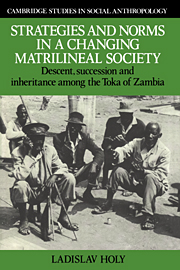 Strategies and Norms in a Changing Matrilineal Society
Strategies and Norms in a Changing Matrilineal Society Published online by Cambridge University Press: 25 August 2009
Apart from rain-making rituals, the final mourning ceremonies (mayobo), at which the successor of the deceased is chosen and the deceased's estate divided among his survivors, are the main situations which the Toka themselves conceptualise in mukowa terms. They say that it is the basimukowa of the deceased who decide on his successor and who inherit his property.
Each mayobo is organised by a kinsman of the deceased who has been living in the deceased's village. If the deceased was a man, he may be assisted by a kinsman of the deceased's wife. The organiser decides on the date of the ceremony and informs the relatives of the deceased in their villages, his relatives who have been working in towns as labour migrants and who should be present, and the headmen of neighbouring villages. As a rule, the mayobo is held over a weekend so that even those kin who work in towns may attend.
A week or so before the mayobo, the preparations for brewing beer start. If the deceased was a man, two groups of women brew beer: his kinswomen or affines and kinswomen or affines of his wife. The two groups are widely helped by other women from the village and by the kinswomen of the deceased who have come from other villages to attend the mayobo. Quite a number of women from neighbouring villages also take part in the work, particularly if close kinship ties exist between their inhabitants.
To save this book to your Kindle, first ensure [email protected] is added to your Approved Personal Document E-mail List under your Personal Document Settings on the Manage Your Content and Devices page of your Amazon account. Then enter the ‘name’ part of your Kindle email address below. Find out more about saving to your Kindle.
Note you can select to save to either the @free.kindle.com or @kindle.com variations. ‘@free.kindle.com’ emails are free but can only be saved to your device when it is connected to wi-fi. ‘@kindle.com’ emails can be delivered even when you are not connected to wi-fi, but note that service fees apply.
Find out more about the Kindle Personal Document Service.
To save content items to your account, please confirm that you agree to abide by our usage policies. If this is the first time you use this feature, you will be asked to authorise Cambridge Core to connect with your account. Find out more about saving content to Dropbox.
To save content items to your account, please confirm that you agree to abide by our usage policies. If this is the first time you use this feature, you will be asked to authorise Cambridge Core to connect with your account. Find out more about saving content to Google Drive.